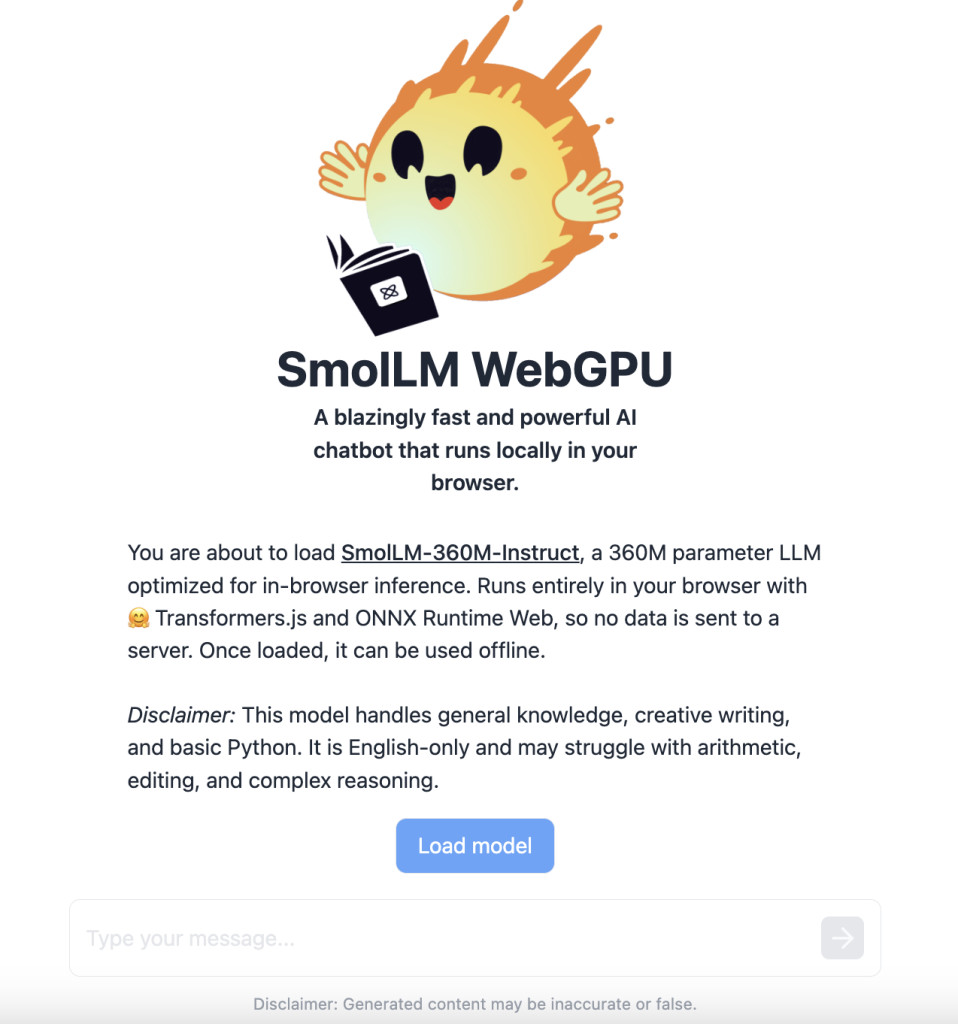The technological landscape has been evolving at an unprecedented rate, and with the recent release of SmolLM WebGPU by Hugging Face, the world of AI has taken a significant leap forward. SmolLM WebGPU is a breakthrough that promises to revolutionize how AI models operate by allowing them to run entirely within a user’s browser. This development is not just a testament to the progress of AI technology, but it also signifies a major shift in how users interact with AI daily.
The Rise of In-Browser AI Models
Artificial Intelligence has long been synonymous with powerful servers and cloud computing. Most AI models, especially those with large parameters, require substantial computational power only dedicated servers can provide. However, Hugging Face’s release of SmolLM WebGPU marks a departure from this model. It brings the power of AI directly into the user’s browser.
SmolLM WebGPU runs SmolLM-360M-Instruct, a language model with 360 million parameters. This model is optimized specifically for in-browser inference, which operates entirely within the user’s local environment. This technology is even more remarkable because it uses WebGPU, a modern graphics API that provides significant computational power within the browser. This enables SmolLM WebGPU to deliver impressive performance without relying on external servers, ensuring that user data remains entirely within their control.
A New Standard for Privacy and Security
One of the most compelling aspects of SmolLM WebGPU is its focus on privacy and security. Traditional AI models often require data to be sent to and processed by remote servers. This can raise concerns like data privacy, as sensitive information could be exposed during transmission or stored on the server. However, this concern is effectively mitigated with SmolLM WebGPU.
Since the model operates entirely within the browser, no data is sent to any server. This means that all interactions with the AI occur locally, giving users complete control over their data. Using the model offline further enhances its security profile, as there is no risk of data breaches from external servers. This makes SmolLM WebGPU an ideal solution for users who prioritize privacy and wish to leverage AI technology without compromising their personal information.
Performance and Versatility
Despite being a browser-based model, SmolLM WebGPU still needs to be more lightweight in terms of performance. The 360M parameter language model can handle various tasks, including general knowledge queries, creative writing, and basic Python programming. Its versatility makes it a valuable tool for users across different domains.
However, it is important to note that while SmolLM WebGPU excels in many areas, it has limitations. The model is optimized for English and may need help with arithmetic, editing, and complex reasoning tasks. These limitations are a trade-off for the convenience and privacy that SmolLM WebGPU offers. Nonetheless, for many users, the benefits of having a powerful AI tool that runs entirely in-browser outweigh these constraints.
The Future of AI with SmolLM WebGPU
The release of SmolLM WebGPU is a significant milestone in the evolution of AI technology. By bringing powerful AI capabilities directly into the browser, Hugging Face has opened up new possibilities for how AI can be integrated into daily life. The ability to run AI models locally within the browser enhances privacy and security and democratizes access to AI technology.
As AI develops, the trend towards in-browser inference will likely grow. SmolLM WebGPU sets a new standard for what can be achieved with browser-based AI, and it is expected that other developers will follow suit, creating even more sophisticated models that can run locally. This shift could lead to a future where AI is seamlessly integrated into web applications, providing users with powerful tools that are both accessible and secure.
Conclusion
SmolLM WebGPU, leveraging the power of WebGPU and running entirely within the browser, offers users a fast, powerful, and private AI experience. While the model has some limitations, its benefits far outweigh these, particularly for users who value data privacy. As Hugging Face continues to innovate, the release of SmolLM WebGPU may well be remembered as a pivotal moment in the journey towards more accessible and secure AI technology.
Check out the Demo and GitHub. All credit for this research goes to the researchers of this project. Also, don’t forget to follow us on Twitter and join our Telegram Channel and LinkedIn Group. If you like our work, you will love our newsletter..
Don’t Forget to join our 49k+ ML SubReddit
Find Upcoming AI Webinars here
The post SmolLM WebGPU: AI with In-Browser Technology, Offering High Performance, Enhanced Privacy, and a Glimpse into the Future of Secure AI Computing appeared first on MarkTechPost.
Source: Read MoreÂ

